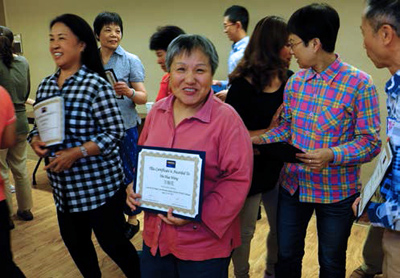Training a New Generation of Leaders
August 12, 2015
Education is key component of Union-building
Members received certificates for June leadership training conducted in Mandarin and Cantonese.

Throughout the histories of the labor and progressive movements, 1199SEIU is lauded as a highly disciplined army of activists for justice and equality. Its officers are praised for their leadership and vision.
But 1199SEIU’s exemplary contracts, exceptional benefits and widely admired political strength are derived not simply from the work of its elected officers, but mainly from its high level of member participation and leadership.
And that leadership did not emerge by chance. It has been developed by the Union’s Education and Leadership Development Department, which partners with officers and organizers to train new leaders by building on what members have learned in their workplaces and communities.
“I used to be afraid and I lacked confidence,” says Lesbia Vidot, a Holyoke, MA, personal care attendant (PCA). “Now I not only speak up for myself, I also help others do the same.”
Vidot credits the change to Union leadership classes that have helped her become an effective delegate, negotiator, lobbyist and organizer. “What I’ve learned has helped me and other PCAs,” she says. “And our biggest victory was winning a $15-an-hour minimum for Massachusetts PCAs.” (See story on page 8.) She is proud that she was among the Union members who helped mobilize co-workers and was a member of the negotiating committee.
1199ers in other regions cite similar experiences. “Joining our Union and taking classes has helped change my life,” says Christine Gadson, a CNA at Apollo Health and Rehab in St. Petersburg, FL. “Although I was progressing in my career, I didn’t know exactly how to fight for what I wanted,” she says. “Delegate training taught me how to fight.”
Gadson says her learning takes place in various environments, not just in formal settings. “Activities like going with our Union to Selma for the anniversary of the [Civil Rights] marches taught me lessons, gave me strength and touched my heart. Seeing people of all colors walking together helped me to continue to walk a straight line in my facility.”
It was injustice at his workplace that influenced Master Johnson, an environmental services worker at Zucker Hillside hospital in Queens, NY, to become a delegate and attend leadership classes. “A while back I felt that members at the hospital were losing their vigilance and that supervisors were taking advantage of that,” Johnson says.
“Delegate classes taught me a lot I didn’t know about the contract, grievances and our rights,” he adds. “After I became a delegate, I helped to get a bad supervisor removed. One of the chief lessons which I pass on to others is that if you fight by yourself, you lose, but unity brings victory.”
"Now I not only speak up for myself, I also help others do the same."
Helping co-workers inspired Mi Lin Lam Chau, a home health aide at Prestige Home Care Services in Manhattan, to take leadership classes conducted in Mandarin and Cantonese for Chinese 1199SEIU activists. “I now feel that I’m equipped to teach what I’ve learned and that I can help organize my co-workers and explain many things to them about our Union,” she says.
“I knew nothing about the Union when I started work,” says Michelle Payne, a CNA at Brighton Manor nursing home in Rochester, NY, and a member of the Union’s executive council. “I became a delegate because I wanted a voice on the job and I wanted fairness for all.
“In the classes I learned how to investigate, how to listen and the best ways to communicate with co-workers and management,” says Payne. “Those lessons have helped her assist in the organizing of non-union workers.
Another important lesson Payne and others cite is the realization that the problems in their institutions are not unique. “So much of what we learn about the workplace can be applied to our communities, especially about health care,” Payne says.
She also credits 1199SEIU with her becoming a political activist. “I’ve come to understand how important politics is for us,” she notes. “Now I assess political candidates based on where they stand on issues that are important not just to my community, but also to our Union.”
PCA Vidot similarly takes pride in her political consciousness and involvement. “Before my training in the Union, I would not have had the confidence to lobby on issues like the Fight for $15 or for candidates like (U.S. Sen.) Elizabeth Warren and President Obama.
“I used to think that unions were no different from corporations, but now I know that the Union is me and my coworkers, and that together we are one.”
Gadson reflects the sentiments of many delegates and activists for whom training has helped them find their voice.
“I’ve learned that if I stand strong with my sisters and brothers for what is right,” she says. “I know that my voice will be heard.”
Read more from the official 1199SEIU magazine ‘Our Life and Times’

